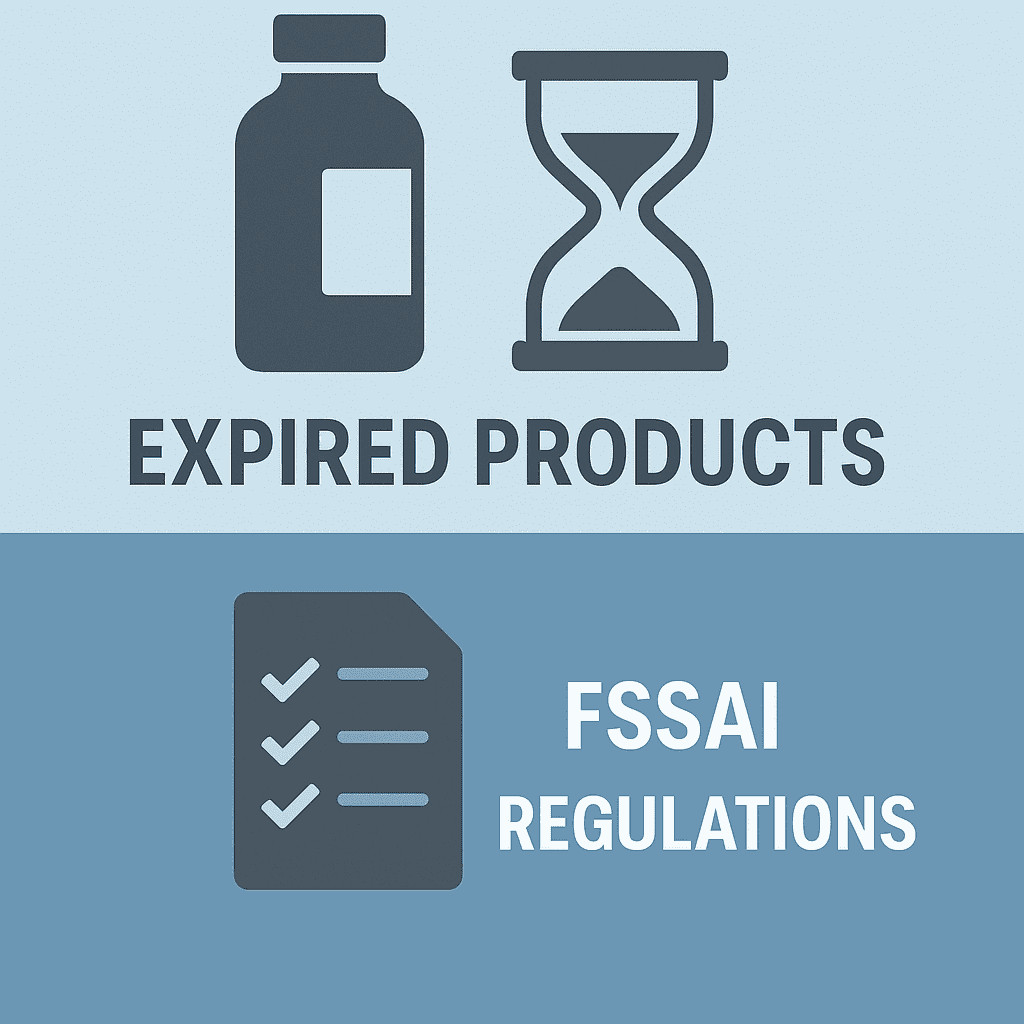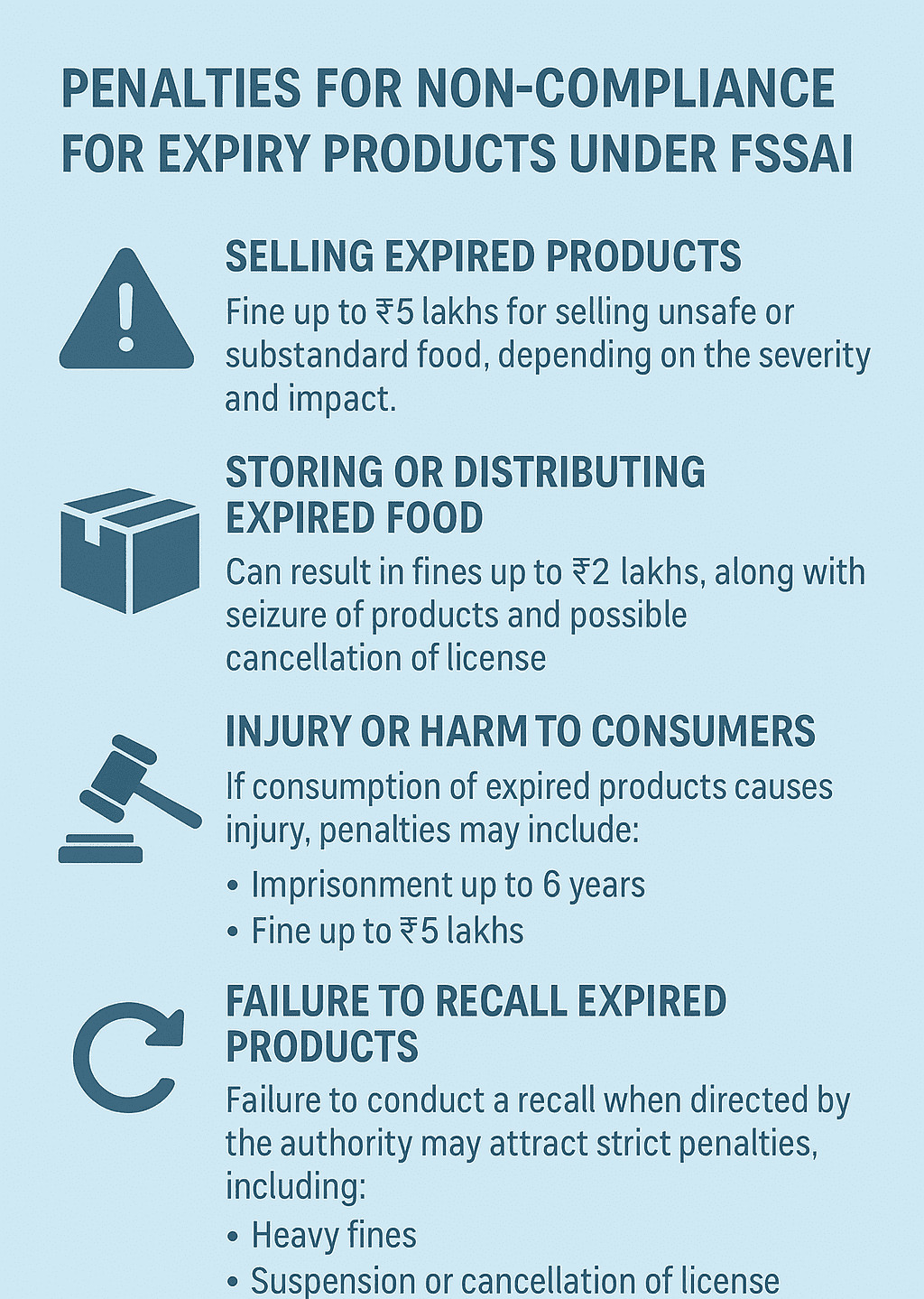Expiry Products under FSSAI Compliance
The public receives food items which need to be both safe and properly labeled with hygienic processing resulting in products that are entirely fit for consumption.
A recall of food products becomes necessary for food businesses when the Food Safety and Standards Authority of India (FSSAI) determines that products endanger safety or violate food regulations.
A food recall functions both as a corrective action together with its function as a preventive measure to protect public health and safety. The implementation of a proper Recall Plan provides food businesses with immediate capabilities to locate hazardous products so they can be safely removed from distribution and minimize non-compliance consequences.
Key Purpose
Reducing expired food product sales works towards securing customer wellness and safety levels.
✔️ Prevent storage, distribution, or display of food items beyond their shelf life
✔️ Maintain food quality standards as per FSSAI regulations
✔️ Promote the availability of safe and consumable food in the market
Food Safety and Standards Act compliance becomes possible through the assistance of this system for businesses.

Who Must Comply?
- Food manufacturers
- Retailers and wholesalers
- Distributors and transporters
- Online food delivery platforms
- Restaurants and hotels
- Importers and exporters
What are Expiry Products?
Products become expiry items when they exceed the dates which the manufacturer has placed on their labels under “Best Before,” “Use By,” or “Expiry Date” categories. The product dating system develops its expiration dates by analyzing both product formula and storage method along with safety analysis results.
The date mentioned on the product label indicates when the item becomes unacceptable to use after which point it must be removed from circulation immediately.
Expiry products lose specific properties that originally gave the product its taste and texture quality and nutritional aspects and effectiveness.
The food becomes unsafe for use because microbial growth combined with spoilage and chemical alterations occur.
Any product must be cleared from all store areas right away because accidental sale or usage must be prevented.
According to FSSAI compliance, any food which exceeds its designated expiration date remains prohibited for sale or service distribution or donation. Regardless of appearance or scent, the food remains unfit for human consumption as per legal requirements.
Additionally, businesses must:
- Establish clear labels for expired stock and use proper methods for its segregation.
- Records about such expired products must be kept to assist with inventory examinations and track each item.
- A proper method exists for safe disposal of expired goods which follows hygienic procedures and environmental protocols.
Firms which handle expired goods effectively both support human health protection and demonstrate their dedication toward food safety alongside regulatory requirements.
Why Is It Important to Follow FSSAI Guidelines on Expiry Products?
Food products that have exceeded their expiration date present both health dangers and threaten the legal framework and moral standards and occupational reputation of all food businesses.
Food Standards Safety Authority of India established strict regulations that protect consumers from receiving expired food products thus maintaining both food safety and business responsibility and public trust.
- Protecting Public Health
Consumers who consume expired food items face multiple health risks from food poisoning through bacterial infections such as Salmonella and E. coli together with allergies and extended health problems. Timely removal ensures public safety. - Legal Compliance
The Food Safety and Standards Act of 2006 states that selling expired food will result in fines up to ₹5,00,000 as well as license suspension and possible imprisonment. - Earning Consumer Trust
Proper food handling techniques help customers trust your brand and prevent damaging news about your products from reaching the public. A single error in selling expired products will damage your reputation for an indefinite period. - Preventing Misuse of Expired Goods
The Food Safety and Standards Authority of India needs traders to report rejected and expired food products every quarter to stop their illicit repackaging and redistribution including animal feed distribution. - Better Inventory & Waste Management
The implementation of First Expire First Out (FEFO) combined with routine checks through digital tracking systems improves waste reduction while saving money and achieving regulatory compliance. - Environmentally Responsible Disposal
The regulations established by FSSAI require all expired food to receive the label “Not for Sale” before proper disposal thus ensuring environmental protection and contamination avoidance.
Benefits of Compliance with FSSAI Expiry Guidelines
- The implementation of Safer Consumer Experience standards ensures that high-quality secure food products are delivered to customers while improving their health satisfaction.
- Reliable reputations encourage loyal customers to stay committed. Proactive brand practices create lasting trust which leads to long-term customer loyalty.
- Legal protection emerges when businesses operate within regulatory bounds because this prevents penalties and licensing complications as well as legal proceedings.
- A more efficient inventory system can be achieved through FSSAI deadlines that enable better stock positioning (FIFO) and waste reduction and storage optimization.
- Your brand gains environmental responsibility through both safe waste disposal and reduced pollution and therefore promotes sustainability.

FBO Responsibilities: Ensuring Food Safety and Compliance
FBO Responsibilities: Ensuring Food Safety and Compliance
Food Business Operators must execute their expiry date management responsibilities according to FSSAI rules. Here are the key responsibilities:
Legal & Regulatory Compliance
- The labeling process must adhere to FSSAI requirements by displaying precise time specifications among “Best Before” or “Use By” dates.
- The prevention of expired product sales will help you avoid penalties.
- The business requires detailed documentation regarding the tracking of expiration dates as well as disposal requirements and staff training programs and recall procedures.
Inventory Management
- Implement FIFO (First-In, First-Out) for stock rotation.
- Regular audits must be performed in order to detect expired items within the facility.
- Products must be stored according to their labels and supply all expired products separately.
- The proper methods both yes and no of dealing with discontinued goods need to be established.
- All expired inventory needs to occupy its own designated area marked for this purpose.
- Follow FSSAI rules for waste disposal of expired items by using authorized handlers.
- A documented recall procedure and its associated records must be maintained.
Staff Training & Consumer Communication
- Staff members need training on proper expiration management procedures and label implementation methods as well as documentation techniques.
- Businesses should inform their customers about product lifetime durations while dealing with their questions appropriately.
Proactive Compliance
- Regularly check FSSAI notifications along with policy modifications.
- A regular evaluation must be conducted on suppliers who verify proper date stamping.
- Digital solutions should be used to both track inventory and ensure compliance.
Frequently Asked Questions (FAQ) – FSSAI Compliance and Expiry Product
1. The FSSAI defines what counts as an expired product through its guidelines.
Any food product expires when the indicated “Best Before” or “Use By” date on its packaging expires. Product expiration dates prevent the adoption of harmful food products or products with degraded quality.
2. The FSSAI prohibits the sale of expired food products in any price category.
No. The Food Safety and Standards Authority of India prohibits every sale and distribution of expired food products regardless of discount offers.
3. Best Before dates indicate when a product reaches its peak quality but remains safe for use while Use By dates define when food ceases to be safe for consumption.
Food quality reaches its peak quality status between the dates given on the package labeled “Best Before.” Products carry a “Use By” date which reveals the maximum time frame for which they remain safe for human consumption. The potential consumption of food should be avoided after reaching the “Use By” date.
4. What are the correct procedures for food business operations regarding outdated inventory?
Businesses must keep expired goods apart from marketable products by using clear labeling for them while storing them in a defined section. The disposal process of food waste requires permanent authorization channels as well as complete documentation for all activities.
5. What did the Food Authority mandate as punishment when vendors sell expired products?
The violation of regulatory guidelines can result in fines up to ₹5,00,000 besides leading to license cancellation of food businesses and product confiscation whenever such cases lead to legal penalties.
6. Strategies exist for businesses to handle expired stock efficiently.
Food businesses must employ the FIFO method to minimize expired stock by using older products before newer ones. Businesses that conduct regular inventory assessments alongside training their staff in data management alongside utilizing digitized expiry date tracking systems will maintain better control and reduce waste from spoiled items.
7. Food business operators must they report food stock past its expiration date to the FSSAI.
Yes. Food Business Operators are bound to provide reports about their expired and rejected stock each quarter. Food Business Operators should maintain detailed records that track their disposal methods for expired stock since they must report this information to FSSAI.
